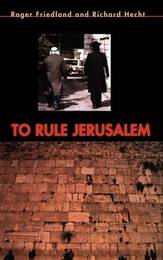
|
To Rule Jerusalem
Hardback
Main Details
| Title |
To Rule Jerusalem
|
| Authors and Contributors |
By (author) Roger Friedland
|
|
By (author) Richard Hecht
|
| Series | Cambridge Cultural Social Studies |
|---|
| Physical Properties |
| Format:Hardback | | Pages:574 | | Dimensions(mm): Height 237,Width 160 |
|
| Category/Genre | Asian and Middle Eastern history |
|---|
| ISBN/Barcode |
9780521440462
|
| Classifications | Dewey:956.9442 |
|---|
| Audience | | Professional & Vocational | | General | | Tertiary Education (US: College) | |
|---|
| Illustrations |
10 Maps; 49 Halftones, unspecified
|
|
Publishing Details |
| Publisher |
Cambridge University Press
|
| Imprint |
Cambridge University Press
|
| Publication Date |
29 March 1996 |
| Publication Country |
United Kingdom
|
Description
Twentieth-century Jerusalem is doubly divided. It is a holy site for both Judaism and Islam. Additionally, secular Israelis and Palestinians alike ground their respective national identities within the city, sharing it with each other and with those of their own faith who yield to a higher divine law rather than a secular democratic one. To Rule Jerusalem is a historical and ethnographic account of how Jerusalem has become the battleground for conflicts both within and between the Israeli and Palestinian communities. Based on hundreds of interviews with powerful players and ordinary citizens over the course of a decade, this book evokes the ways in which struggles are experienced and managed in the life of the city. To Rule Jerusalem is a forceful study of the intertwining of religion and politics, exploring the city as simultaneously an ordinary place and an extraordinary symbol.
Author Biography
fm.author_biographical_note1 fm.author_biographical_note2
Reviews'To Rule Jerusalem is the most comprehensive study of its kind to date, and a welcome scholarly complement to existing journalistic accounts with a similar focus. It reveals extraordinary insight into the complexities which shape this city, and it is beautifully written ... invaluable reading for anyone concerned with understanding how and why this small city at once holds the key to peace in the Middle East and threatens to undermine all its prospects.' Cecilia Albin, International Affairs
|